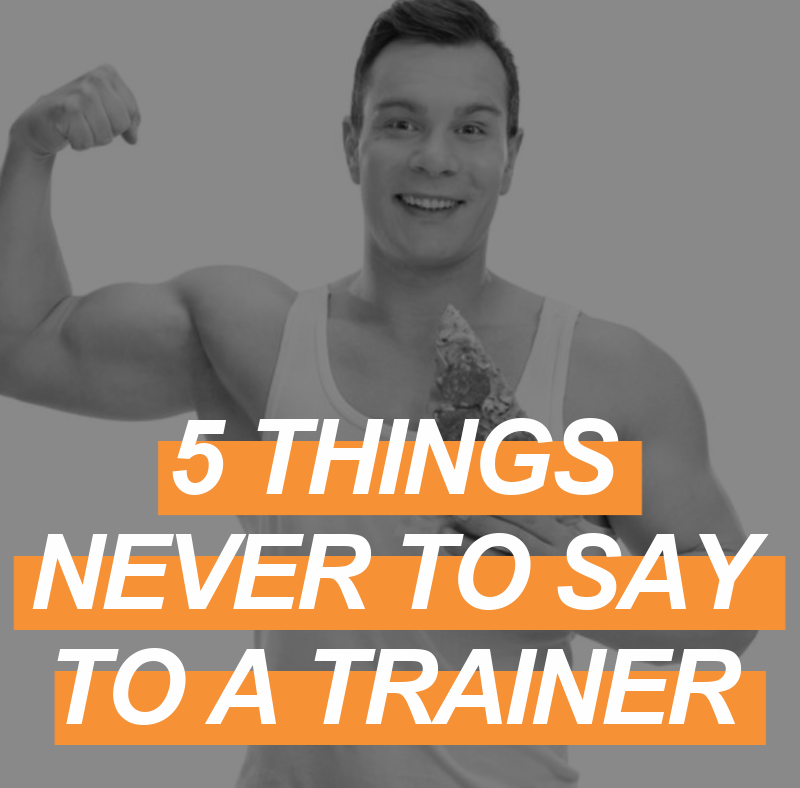
If you’ve been in the fitness industry long enough, you may field questions that would make any professional bristle. The following gems may seem somewhat offensive, but more often than not, the offender usually does not know how insulting their questions sound (usually, I said). How we respond to ingrained assumptions is how we can collectively change the perception of our important jobs as health coaches and fitness professionals. Here are five things never to say to a personal trainer, coupled with the best retorts that may help others reframe the importance of what you do.
First thing never to say to a personal trainer: “So is this your real job?”
I wish I haven’t been asked this as often as I have. Many people have made yoga instruction, small group training, and personal training something of a side hustle, making many others quick to assume that one can’t possibly be serious enough to dedicate a career to health and fitness. They may think there’s no money in it to support a family, or perhaps they are stuck in a 20th-century mentality that personal trainers are just uneducated meatheads, trying to capitalize on the layperson’s lack of fitness knowledge.
Respond with: “Being a fitness professional is more than just a job to me. It’s my career and primary source of income. I’m proud to say I’m doing quite well—both financially and with improving health outcomes with my clients.” Then hand them your business card and let them know if they’re interested in working with you, you can add them to your waitlist.
And hey—if you are at present not actually doing well financially and don’t feel comfortable mentioning this piece, you can certainly talk about your education. If you’ve got a degree in kinesiology or exercise science, say so– and mention the challenge of the certification process and continuing education. These experiences have given you immense insight into the complexity of the human body, and now more than ever with overweight and obesity rates over 70% and lifestyle choices at the root of all-cause mortality, fitness professionals have never been more necessary. BOOM!
Second thing never to say: “You’re not jacked! How can you train people?”
Again, many folks are stuck in this notion that fit pros have to look like competitive bodybuilders. Nothing could be further than the truth. While, yes, many of us are interested in strength and hypertrophy, just as many of us are endurance athletes, for which bulking would prove contradictory.
The same goes for trainers who don’t fall into a “fat-free” body mass category. Not everyone who knows what they’re doing needs to be super lean. On the flip side of endurance training is Olympic and powerlifting—strong man/woman competitions. Often these strong folks look hefty, if not muscular. Suffice it to say, it takes all kinds to round out this industry, and how someone looks is not necessarily an indication of how effectively they can train someone for their unique goals.
Respond with: “For the way I train, being overtly muscular isn’t actually desirable. However, you might be interested to know that max strength is not necessarily correlated with muscle size. I currently hold over 15 certifications on various training methodologies from Kettlebell training to corrective exercise. In fact, much of my work focuses on correcting postural distortions and muscle imbalances, which often are responsible for chronic pain conditions.”
Third thing never to say: “You eat pizza??”
Well, maybe you don’t eat pizza, but insert whatever indulgent food you are consuming in front of others to trigger the reaction: “You’re not perfect 100% of the time? WHAT???”
Many people suffer from the delusion that if your body composition is balanced, or if you are fit and it shows, that you have to eat a perfectly clean, balanced diet 100% of the time. This is a great opportunity to not only set the record straight with regard to common personal trainers’ lifestyle habits, but how flexible and healthy it is for everyone to indulge their cravings from time to time and enjoy life.
Respond with: “Yes, of course, I eat pizza! Once a week, in fact. I believe in balance. And since I make a strong effort to eat nutrient-dense, whole foods most of the time, once in a while I think it’s totally okay to eat something for pure enjoyment. Everyone should! The key is balance. One night of pizza-eating won’t sabotage my efforts.”
Fourth thing never to say: “What do you really do besides count?”
Unfortunately, there are some trainers out there that give us a bad rap. They stand there, looking at their phones, despondently walking their clients from one machine to the next counting out the reps. The person now asking you about your role as a fit pro may have seen this more often than they should have. So, try not to be too offended here and acknowledge that, like any profession, there are skilled and engaged trainers, and there are checked-out rep-counters.
Respond with: “Yeah, I know some trainers out there who can be a bit disengaged, but personally, I take a great deal of time programming for my clients, which is actually the hardest part. There’s a complex interplay of volume, intensity, and weight selection that I have to plan for each client. Actually, knowing when to end a set is something a lot of people don’t know how to do properly without guidance and end up not seeing results! So believe it or not, counting reps can be pretty important!”
Last thing never to say to a personal trainer: “How can you ask $85/hour for what you do?”
There’s no getting around that this is indeed a rude question. Taking aim at a person’s fee scale and assuming they aren’t worth what they’re asking is a social faux pas any way you slice it. This person probably makes around the same or more and honestly doesn’t think what you do has that much value. It’s not incumbent upon you to prove your worth to this person, but you might knock ’em down a notch or two.
Respond with: “I know my worth and what the market commands. I’m pretty good at what I do, and my clients must agree, because they have no problem paying my rates. Especially since I’ve helped many of them achieve what they were unable to do alone—like, eliminate shoulder pain. You know—how sitting can cause upper body dysfunction, disrupting the balance between the cervical and thoracic spine segments, often resulting in weak rhomboids, overactive levator scapulae, and excessive glenohumeral medial rotation. Ya dig?”
Okay, you don’t have to sound like a know-it-all, but don’t feel bad dropping some knowledge on folks who assume you are uneducated or unworthy of commanding a competitive rate.
The point is, you do indeed have an important job. Feel confident letting the world know that you know what you’re doing and helping people to adopt a healthy lifestyle is among the most valuable services anyone can offer.






